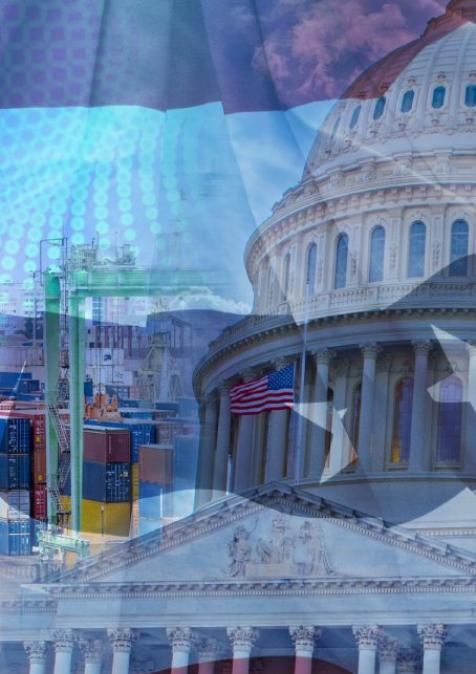Introduction à la structure et aux principaux thèmes du Forum
- Harinder Kohli, directeur fondateur et directeur général, Forum des marchés émergents (FEM)
Session de dialogue - Vision sur les perspectives politiques et économiques mondiales
Modérateur
- Harinder Kohli, directeur fondateur et directeur général, Forum des marchés émergents (FME)
Orateur
- Hiroshi Watanabe, président de l'Institut des affaires monétaires internationales
RELATED CONTENT
-
 AuthorsApril 10, 2025Marcus Vinicius De Freitas Professor, China Foreign Affairs University Senior Fellow, Policy Center for the New South The Chinese government’s white paper, ‘China’s Position on Some Issues Concerning China-US Economic and Trade Relations,[1]’ issued on April 9, 2025, in response to the escalating tariffs imposed by President Donald Trump, is not just a diplomatic response to the escalating tensions with the United States. It is a meticulously crafted strategic document that pr ...
AuthorsApril 10, 2025Marcus Vinicius De Freitas Professor, China Foreign Affairs University Senior Fellow, Policy Center for the New South The Chinese government’s white paper, ‘China’s Position on Some Issues Concerning China-US Economic and Trade Relations,[1]’ issued on April 9, 2025, in response to the escalating tariffs imposed by President Donald Trump, is not just a diplomatic response to the escalating tensions with the United States. It is a meticulously crafted strategic document that pr ... -
April 8, 2025رغم التحسن النسبي في بعض المؤشرات الاقتصادية الكبرى في المغرب، إلا أن التشغيل ما يزال الحلقة الأضعف في معادلة التنمية. في هذا السياق، أعلنت الحكومة المغربية عن خارطة طريق وطنية للتشغيل تهدف إلى خفض البطالة إلى تسعة في المئة وخلق مليون منصب شغل، بالإضافة إلى أربعمئة وخمسين ألف منصب شغل ف...
-
Oumayma Bourhriba et Saloi El YamaniApril 04, 2025In this episode, we discuss with an economist how digital technologies like AI, blockchain, and autonomous ships are reshaping global trade and logistics. These innovations improve effici ...
-
Abdessalam Jaldi and Samir BhattacharyaMarch 28, 2025In recent years, India has strengthened its ties with Africa, focusing on economic development and trade exchanges. With initiatives aimed at promoting commerce, investments, and technolo ...
-
 AuthorsMarch 26, 2025Ce commentaire a été publié initialement sur commentaire.fr La question du protectionnisme ne date pas du retour triomphal de Donald Trump, ni même de sa première élection : elle hante la mondialisation depuis le début du xxie siècle. Le nouveau programme du Président américain oblige toutefois à y réfléchir plus attentivement qu’on ne l’a fait jusqu’à présent. C’est l’objet de cet article. ...
AuthorsMarch 26, 2025Ce commentaire a été publié initialement sur commentaire.fr La question du protectionnisme ne date pas du retour triomphal de Donald Trump, ni même de sa première élection : elle hante la mondialisation depuis le début du xxie siècle. Le nouveau programme du Président américain oblige toutefois à y réfléchir plus attentivement qu’on ne l’a fait jusqu’à présent. C’est l’objet de cet article. ... -
AuthorsMarch 25, 2025When President Donald Trump gave his State of the Union address to a joint session of the United States Congress on March 4, 2025, many of his announced tariffs went into effect. These included a 25% levy on most goods imports from Canada (10% on oil and gas) and Mexico (though Trump subsequently exempted Canadian and Mexican imports that satisfy USMCA rules of origin requirements); and 20% (doubling the 10% implemented in February) on all imports from China. A 25% tariff has been i ...
-
AuthorsSampawende J. TapsobaMarch 24, 2025The return of President Donald Trump could significantly impact macroeconomic policy in Africa. The effects may vary across the continent. Nations that remain neutral towards U.S. influence are likely to benefit, while those aligned with the U.S.'s rivals or lacking immediate economic advantages may be deprioritized in U.S. foreign policy. In this article, we examine the channels through which U.S. policies and the change in political discourse could affect macroeconomic policies in ...
-
AuthorsMarch 21, 2025MENA faces a severe water crisis, with 12 of the world’s 17 most water-stressed countries. Climate change, population growth, inefficient water management, and weak governance drive this challenge. Water production, treatment, and distribution require high energy inputs, while energy generation depends on water for cooling and refining. The region must integrate renewable energy, especially solar power, into water solutions like desalination. Inaction could shrink GDP by up to 14% ...
-
AuthorsMarch 20, 2025Le marché du travail marocain traverse des défis structurels majeurs, avec un taux de participation relativement faible (43,5 %) et encore plus marqué chez les femmes, dont la participation reste inférieure à 20 %. Le chômage, quant à lui, est élevé, particulièrement parmi les jeunes diplômés, atteignant 30 %, et une grande partie de l'emploi urbain se trouve dans le secteur informel, représentant entre 20 et 40 % des emplois. Ce marché est également marqué par des d ...
-
 AuthorsMarch 20, 2025This paper (see pages: 152-164), included in the report 'The Reckoning Regression or Renaissance?' was originally published on orfonline.org Calls for reforms of the International Financial Architecture (IFA) are foregrounded by the growing financing needs of developing countries, driven by mounting climate-related challenges; conflict and violence; rising numbers of internally displaced persons (IDPs); and macroeconomic imbalances, including crippling debt service and debt dist ...
AuthorsMarch 20, 2025This paper (see pages: 152-164), included in the report 'The Reckoning Regression or Renaissance?' was originally published on orfonline.org Calls for reforms of the International Financial Architecture (IFA) are foregrounded by the growing financing needs of developing countries, driven by mounting climate-related challenges; conflict and violence; rising numbers of internally displaced persons (IDPs); and macroeconomic imbalances, including crippling debt service and debt dist ...







